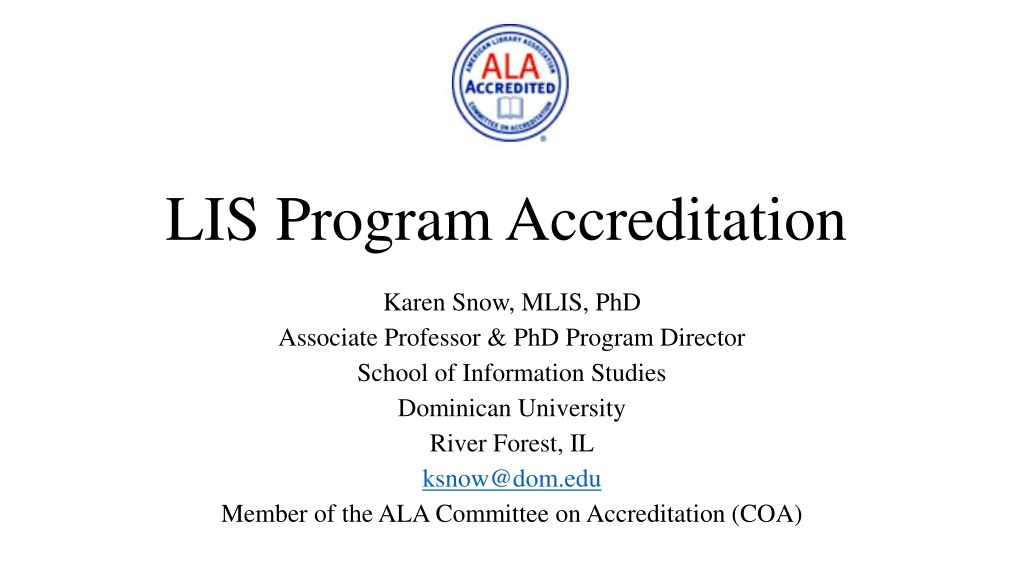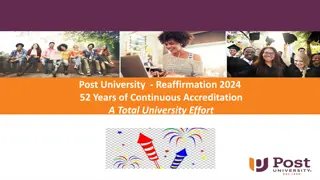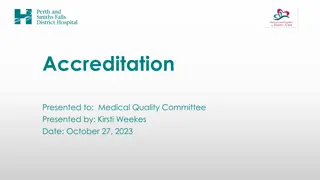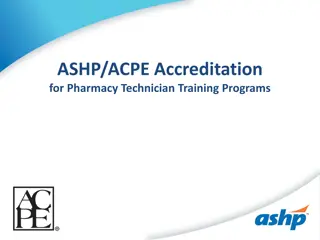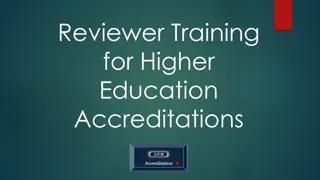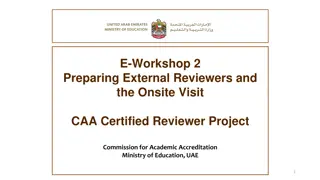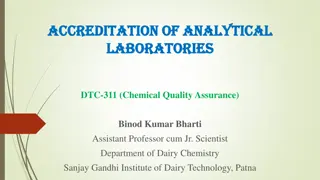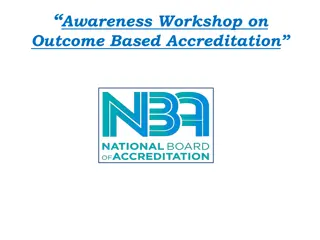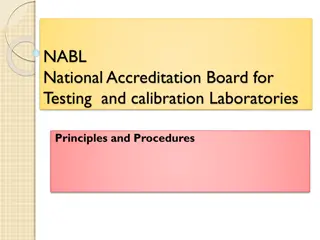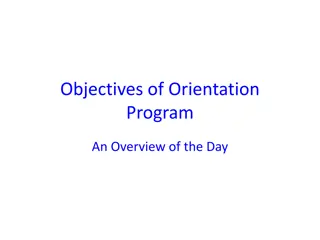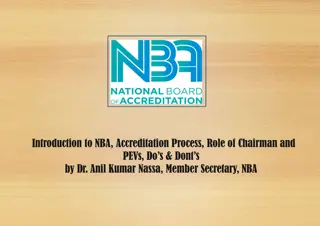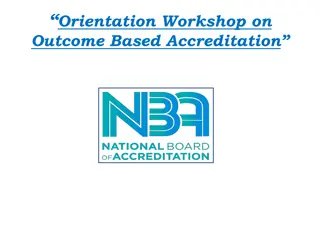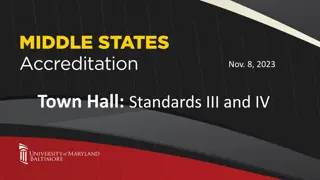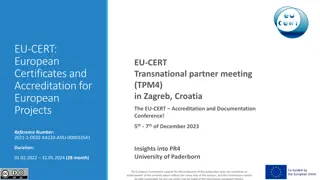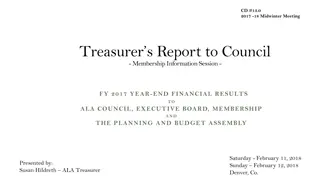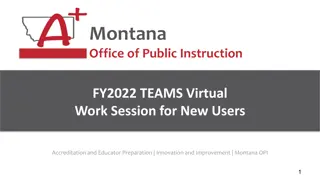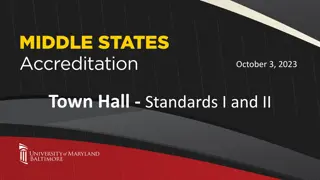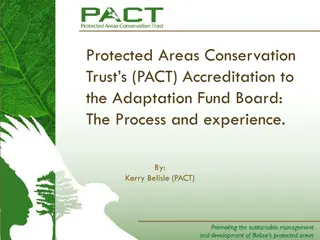Understanding ALA Accreditation Process and Importance
Accreditation is a voluntary system ensuring higher education quality. ALA accredits Master's degree programs since 1925, not schools or institutions. Accreditation guarantees academic standards and integrity. Get insight into ALA accreditation basics, process, and how you can participate.
Download Presentation

Please find below an Image/Link to download the presentation.
The content on the website is provided AS IS for your information and personal use only. It may not be sold, licensed, or shared on other websites without obtaining consent from the author. Download presentation by click this link. If you encounter any issues during the download, it is possible that the publisher has removed the file from their server.
E N D
Presentation Transcript
LIS Program Accreditation Karen Snow, MLIS, PhD Associate Professor & PhD Program Director School of Information Studies Dominican University River Forest, IL ksnow@dom.edu Member of the ALA Committee on Accreditation (COA)
Topics Today What is accreditation and why is it important? ALA accreditation basics Committee on Accreditation (COA) Important ALA accreditation documents How *you* can get involved in ALA accreditation! 2
What is Accreditation & Why is it Important? Accreditation is a voluntary system of evaluation of higher education institutions and programs. It is a collegial process based on self- evaluation and peer-assessment for improvement of academic quality and public accountability. Accreditation assures that higher education institutions and their units, schools, or programs meet appropriate standards of quality and integrity. http://www.ala.org/educationcareers/accreditedprograms/faq 3
ALA Accreditation The American Library Association has been accrediting programs since 1925. ALA accredits Master s degree programs. It does not accredit schools/institutions. It does not accredit Bachelor s or Doctoral degrees. Programs can be completely online, in-person, or hybrid. Currently, ALA accredits 67 degree programs at 63 institutions in the United States, Canada, & Puerto Rico (some institutions have more than one ALA-accredited degree program). Two programs (not included in the total above) have Candidacy Status (seeking accreditation) Old Dominion University & University College London 4
As of 2021 67 programs accredited by ALA (63 institutions some institutions have more than one accredited program) 5
ALA Accreditation ALA Office of Accreditation Director: Karen O Brien Associate Director: Susana Stoll Committee on Accreditation (COA) 12 members Two (2) Public Members with two-year, staggered terms (may be renewed once) Eight (8) ALA Members with four-year, staggered terms (non-renewable) One (1) Canadian Member with a four-year, staggered term (non-renewable) One (1) designated Dean/Director position, with a four-year, staggered term (non-renewable) made by the ALA appointing officer from a list of recommendations made by the ALISE Council of Deans and Directors 6 http://www.ala.org/aboutala/committees/ala/ala-coa
Committee on Accreditation (COA) Meets 4 times a year (Midwinter, Annual, Spring, Fall) The COA is a standing committee of the ALA. Its charge is to be responsible for the execution of the accreditation program of the ALA, and to develop and formulate standards of education for library and information studies for the approval of Council (ALA Handbook of Organization). 7 http://www.ala.org/educationcareers/sites/ala.org.educationcareers/files/content/AP3/4thedition/AP3_4th_ed_I.3_current_0.pdf
Committee on Accreditation (COA) The COA is guided by the following principles: The accreditation of library and information studies (LIS) educational programs is coordinated through a single agency that represents the interests of the members of the profession; Accreditation enhances the quality of library and information services through the improvement of the professional education available for librarians and related information professionals; The spirit of accreditation lies in its constructive and continual evaluation and assessment of LIS educational programs. 8 http://www.ala.org/educationcareers/sites/ala.org.educationcareers/files/content/AP3/4thedition/AP3_4th_ed_I.3_current_0.pdf
Committee on Accreditation (COA) The COA seeks to achieve the following objectives: To respond to the content and emphasis of the Standards; To incorporate suggestions of the LIS educational community and the LIS profession; To conform to good practices in the accreditation process in accord with provisions set forth by the Council for Higher Education Accreditation (CHEA) and the Association of Specialized and Professional Accreditors (ASPA). 9 http://www.ala.org/educationcareers/sites/ala.org.educationcareers/files/content/AP3/4thedition/AP3_4th_ed_I.3_current_0.pdf
Accreditation Documents Two main documents guide the ALA accreditation process and decision-making: Accreditation Process, Policies and Procedures (AP3), fourth edition Standards for Accreditation of Master's Programs in Library and Information Studies (2015) 10
Accreditation Process, Policies and Procedures (AP3) I. Overview of ALA accreditation The role of accreditation, accreditation terms, Committee on Accreditation, Office for Accreditation, confidentiality and conflicts of interest, accreditation status categories and procedures, types of reviews, and program reporting requirements. II. Guidelines for the Self-Study and comprehensive review Purpose of the Self-Study (SS), Plan for the SS, SS format requirements, suggested evidence for meeting the Standards for Accreditation, and SS development timeline. III. Guidelines for the External Review Panel Role and responsibilities of External Review Panel (ERP) and ERP Chair, composition of the ERP, exit briefing, ERP report, and timeline for site visit and ERP report. IV. Appeal Process Introduction to appeal process, grounds for appeal, burden of proof, procedure overview, confidentiality, Appeal Review Committee (ARC), appeal process details, specifics of the ARC meeting, role of the ALA Executive Board, and appeal process timeline and deadlines. 11 http://www.ala.org/educationcareers/accreditedprograms/standards/AP3
Standards for Accreditation of Master's Programs in Library and Information Studies There are five Standards, with multiple sub-Standards under each: Standard I. Systematic Planning Standard II. Curriculum Standard III. Faculty Standard IV. Students Standard V. Administration, Finances, and Resources 12
http://www.ala.org/educationcareers/accreditedprograms/standards/http://www.ala.org/educationcareers/accreditedprograms/standards/ 13
http://www.ala.org/educationcareers/accreditedprograms/standards/http://www.ala.org/educationcareers/accreditedprograms/standards/ 14
How Can I Get Involved in ALA Accreditation? Volunteer for External Review Panels (ERP) or to be on COA itself. We really need more LIS practitioners on ERPs!! If you are student in an LIS program, speak up! Programs should be involving students in planning and decision-making ask to be on committees, be an active member of the student association, don t be shy about sharing your thoughts/concerns/ideas with the program director/chair, etc. (fill-out those surveys!!). 15
How Can I Get Involved in ALA Accreditation? If you are an alumnus/a of an LIS program, let them know you want to provide feedback, be on the alumni council, etc. (fill-out those surveys!!). If you employ LIS program graduates, let the programs they are associated with know about how your employees are doing: what they are doing well, knowledge/skill gaps, what you would like to the see the LIS program doing/teaching (fill-out those surveys!!). 16
Feedback on Standards? COA has begun the Standards revision process and wants to hear from stakeholders! Formal opportunities to provide feedback will be available later on this year. Standards Review Subcommittee lead is Linda C. Smith (University of Illinois). Please send your feedback via email: lcsmith@illinois.edu 17
Breakout Room Questions What questions do you still have about the ALA accreditation process and standards? How would you like to be involved in ALA accreditation? (ERP? Feedback to LIS program?) 18
Resources Committee on Accreditation (COA) charge & list of members: http://www.ala.org/aboutala/committees/ala/ala-coa ALA Office for Accreditation homepage: http://www.ala.org/aboutala/offices/accreditation Directory of ALA-Accredited and Candidate Programs in Library and Information Studies: http://www.ala.org/educationcareers/accreditedprograms/directory Resources for External Review Panelists (includes a link to apply to be an ERP member): http://www.ala.org/educationcareers/accreditedprograms/resourcesforerp 19
Resources Accreditation Process, Policies and Procedures (AP3), fourth edition: http://www.ala.org/educationcareers/accreditedprograms/standards/AP3 Standards for Accreditation of Master's Programs in Library and Information Studies (2015): http://www.ala.org/educationcareers/accreditedprograms/standards/ Accreditation Frequently Asked Questions: http://www.ala.org/educationcareers/accreditedprograms/faq 20
